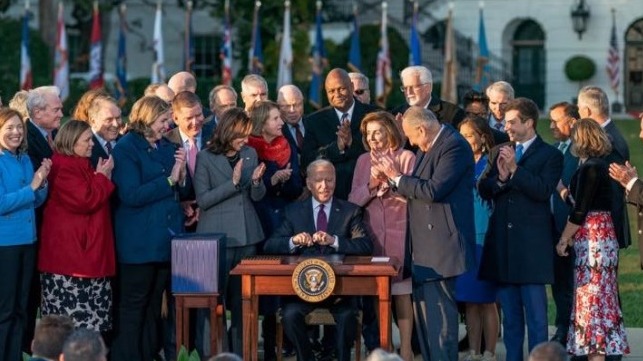Biden Signs Landmark Infrastructure Bill Into Law

On Monday afternoon, President Joe Biden signed a long-awaited $550 billion infrastructure bill into law. In addition to $66 billion for passenger-rail operator Amtrak and $110 billion for roads and bridges, the bill contains about $5 billion for coastal seaports and another $5 billion for inland waterway infrastructure and flood control.
The American Association of Port Authorities (AAPA) hailed the bill's enactment as "a productive start to a more modernized and resilient supply chain." America's biggest ports have been struggling to move record-setting volumes of imported consumer goods, and the Biden administration has announced plans to quickly allocate funding for projects that can alleviate cargo congestion.
Port of Long Beach Executive Director Mario Cordero and AAPA President and CEO Chris Connor were on hand at the White House for the signing event - a recognition of the role that seaport leaders played in advocating for the bill.
The Infrastructure Investment and Jobs Act includes several streams of direct funding for seaports:
- The Port Infrastructure Development Program (PIDP) receives an additional $2.25 billion for port equipment and facilities improvements
- The Army Corps of Engineers receives an estimated $1.5 billion for its Construction account for federal coastal navigation channels, plus an additional $1.2 billion for maintenance dredging in its Operations and Maintenance account
- Marine Highways receives $25 million
- A new program to reduce truck emissions at ports receives $250 million
Taken together, these elements provide more than $5 billion (0.9 percent of the total) in direct federal funding for ports, with billions more available for port-related and port-eligible projects like intermodal rail development.
In a memo, AAPA noted that while this direct assistance amounts to less than one percent of the total package, the discretionary funding in the bill provides billions more for all kinds of projects - potentially including port infrastructure, if ports can successfully compete with or team up with other industries for grant money.
"As the Biden Administration vets which transport modes are most 'shovel worthy' and which yield the biggest return on investment, AAPA will keep making the case that everything begins and ends at America’s freight gateways: its seaports," the association said. "With people around the globe discussing the effect of snarled supply chains on their lives and businesses - in salons, on the news, at the kitchen table, and in the White House - there is a political clarion call for better freight planning and an opportunity for government to lend a long-awaited hand."
The AAPA is also looking forward to securing additional funding for ports in the $1.75 trillion "Build Back Better" social-spending bill. The upcoming legislation includes $3.5 billion for port electification and $600 million for the Port Infrastructure Development Program (about 0.2 percent of the total).
